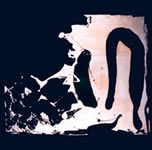|
|
 |
Dusted Reviews
Artist: Nat Baldwin Album: Solo Contrabass Label: Peacock Review date: Aug. 6, 2003 |

|
|
|
 |
Screechy, Skronky Solo Improv
As I left a Nat Baldwin concert in Connecticut last fall, I heard a confused audience member ask her friend, “Why aren’t there any notes?” It’s a fair question – Baldwin’s music isn’t unusual because he plays mostly extended techniques instead of notes; plenty of improvisers do that. Rather, it’s unusual because he plays extended techniques like notes: they’re not arranged like melodic lines, but they’re expressive and they’re arranged in structures that develop in fairly traditional ways. Baldwin’s extended techniques are more overtly emotional than those of the sssssssshhhhhhpppppff-improv crowd – they’re more similar to Penderecki's Threnody to the Victims of Hiroshima than to, say, Keith Rowe.
Solo Contrabass is Baldwin’s first solo effort after appearing on a number of recordings by groups based in Middletown, Connecticut (Baldwin now lives in New Hampshire). Although it's got some rough edges, Baldwin is clearly on the right track, playing in a style that doesn't obviously sound like anyone else.
Solo Contrabass is especially engaging when it's at its most visceral and least studious. The opening "Wounds," for example, is an ultra-fast mishmash of squeaks and open-string tumbles so exhausting that Baldwin audibly gasps for breath by its end. It's one of the most effective tracks because it's one of the least precise – the listener is allowed to concentrate on the energy of the piece, not the sounds of which it's composed. The wonderful beginning of "And Two Wires" consists of several minutes of high-pitched squeals that will make you swear Baldwin hired Mats Gustafsson and didn't credit him.
The album occasionally goes astray elsewhere, as Baldwin sometimes gets a bit too concerned with form and development, trying to weave together lots of disparate techniques. He is also prone to more meditative moments that are hard to hear without turning up the volume. Normally, this wouldn't be a bad thing, and in fact it's probably a sign of musical maturity. But in this context, the less aggressive, less continuous sections rarely work: the contrabass is a bit too dead-sounding, and a little too limited in terms of range, to fill space in quieter moments the way a saxophone would.
Still, even the more formally complex and quieter pieces have plenty of exciting moments, in which Baldwin's urgent squeaks and knocks set him apart from other improv bassists. Baldwin was born in 1980, which makes him a toddler in avant years. And Solo Contrabass would be remarkable even without that bit of information.
By Charlie Wilmoth
|







